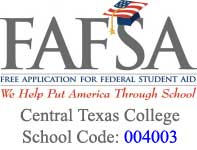Central Texas College participates in the William D. Ford Federal Direct Loan (Direct Loan) Program. This program provides students at CTC with the opportunity to borrow Direct Subsidized Loans, Direct Unsubsidized Loans, and Direct PLUS Loans to help pay for educational expenses. Funds are provided directly by the U.S. Department of Education to eligible borrowers through participating schools and must be paid back with interest.
TYPES OF DIRECT LOANS OFFERED
Through Central Texas College’s Financial Aid Office, we process three types of Direct Loans: Direct Subsidized Loans, Direct Unsubsidized Loans, and Direct Parent PLUS loans.
For more information regarding the types of direct loans, please review the Types of Direct Loans Offered.
HOW TO APPLY
Student loans for the Fall and Spring semesters are applied for by completing and submitting the FAFSA. The loans for which a student is eligible will be included in their financial aid offer and additional loan requirements listed in the Financial Aid Checklist available in Eagle Self-Service. Please note the specific types and amounts of the student loans included in your financial aid offer and only borrow what you need.
Parent PLUS loans are available for eligible parents of dependent undergraduate students to help pay for the cost of the student's education. To apply, parents must complete the Direct PLUS Loan Application for Parents online at https://studentaid.gov/plus-app/.
ELIGIBILITY REQUIREMENTS
In addition to the basic eligibility criteria required for all federal student aid programs, direct loan borrowers have specific eligibility requirements that must be met:
- Be enrolled at least half-time (6+ credit hours) in eligible courses simultaneously.
- Complete Entrance Counseling which provides information to ensure that you understand the responsibilities and obligations you are assuming as a student loan borrower. For more information please review the Direct Loan Entrance Counseling Handbook.
- Complete a Master Promissory Note (MPN) which is a legal document in which you promise to repay your student loans and any accrued interest and fees to your lender or loan holder. It also contains a Borrower's Rights and Responsibilities Statement that explains the terms and conditions of the loans you receive.
- Complete Exit Counseling if status drops below half-time (6 credit hours) in eligible courses or graduates.
The Entrance Counseling and MPN can both be completed online at https://studentaid.gov/.
LOAN REQUIREMENT DEADLINES FOR EACH SEMESTER
Fall: October 30th
Spring: March 30th
Summer: June 30th
2024-2025 LOAN FEES
Interest Rates:
Direct Subsidized Loans: 6.533%
Direct Unsubsidized Loans: 6.533%
Direct Parent PLUS Loans: 9.083%
Origination Fees:
Direct Subsidized Loans: 1.057%
Direct Unsubsidized Loans: 1.057%
Direct Parent PLUS Loans: 4.228%
NOTE: Origination fees and interest rates are subject to change. The above interest rates are for loans disbursed on or after July 1, 2024, and before July 1, 2025. New origination fees go into effect each October 1st.
UNDERGRADUATE DIRECT LOAN LIMITS
Students borrowing a Direct Subsidized or Unsubsidized student loan are subject to both annual and aggregate loan limits:
- Annual loan limit: The maximum amount that a student can borrow in an academic year (Fall, Spring and Summer semesters)
- Aggregate loan limit: The total loan amount that a student can borrow during their academic career
The combined total of students' financial aid offers cannot exceed their Cost of Attendance, even if they have not reached their annual or aggregate loan limits.
| |
Dependent Student |
Independent Student |
|
Freshman Student
(0-30 credit hours)
|
$5,500
(no more than $3,500 subsidized)
|
$9,500
(no more than $3,500 subsidized)
|
|
Sophomore Student
(31+ credit hours)
|
$6,500
(no more than $4,500 subsidized)
|
$10,500
(no more than $4,500 subsidized)
|
|
Aggregate Loan Limits
|
$31,000
(no more than $23,000 subsidized)
|
$57,500
(no more than $23,000 subsidized)
|
Dependent students without parental information who have received approval through the Dependent Unsubsidized Loan Request are eligible for an unsubsidized loan only. A dependent freshman will be eligible for up to $5,500 and a dependent sophomore will be eligible for up to $6,500.
DISBURSEMENTS
Your student loans will disburse two times per semester, the first being 10 days (or the next business day) before the first day of classes for the semester and the second is mid-semester. However, if you have not previously received a federal student loan then your first disbursement will be delayed 30 days after the start date of your classes.
To review your disbursement schedule, please see your Disclosure Statement. On the date of each disbursement, you must be meeting eligibility requirements to receive that disbursement. Your disbursement will release to your student account first.
Per the Department of Education, loans must disburse in two separate payments. You will notice a portion of loan funds will say "ineligible" in your Eagle Self-Service, as you aren't eligible for those funds until it's time for them to release. Please check the disbursement dates.
REFUNDS
Refunds are processed within 30 days of your disbursement. Please contact the Business Office for refund questions.
CANCELLING YOUR DIRECT LOAN
Student and parent loan borrowers have a right to request cancellation of all or part of a loan prior to disbursement or within 14 days of notification that loan funds have been credited to the student account. If loan funds have been refunded to the student or parent then that amount of the loan disbursement cannot be canceled and must instead be repaid to the Department of Education through the loan servicing company.
Please contact our office to request loan cancellation or for further information about the cancellation or repayment process.
REPAYMENT
Student loan borrowers will have six months after you withdraw, drop below half-time enrollment, or graduate before you must begin repaying your student loans. Once repayment starts, it is important to make payments on time to avoid delinquency and default. It is helpful to use your six month grace period to get financially settled and prepare for repayment by:
The Department of Education offers several repayment plans to choose from. If you do not choose one then you will be placed on the standard repayment plan which schedules monthly payments to have your loans paid off in 10 years. Your loan servicer will provide specific payment information and assist in processing payments as well as with other administrative tasks associated with maintaining your student loans. You can find your loan servicer by signing in to the National Student Loan Data System (NSLDS).
Sample Loan Repayment Schedule
| Loan |
Amount Borrowed |
Interest Rate |
Standard Repayment Plan |
Interest |
Total Paid |
| Direct Subsidized/Unsubsidized Loan |
$5,500 |
6.533% |
120 months,
$60 per month |
$1,663 |
$7,163 |
| Direct Parent PLUS Loan |
$7,000 |
9.083% |
120 months,
$83 per month |
$2,988 |
$9,988 |
Additional information can be found in Federal Student Loans: Repaying Your Loans.
CORONAVIRUS STUDENT LOAN SUSPENSION
- The coronavirus relief package suspends federal student loan payments through June 30, 2023.
- Federal student loan interest rates also drop to 0% during the same period
- The measures apply only to federal student loans and have no effect on private loans
For more information regarding the suspension of federal student loans please click here.
CONTACT US
Contact your Central Texas College's Financial Aid Loan Officer
Federal Direct Loans Program
254-526-1519
direct.loans@ctcd.edu
FREQUENTLY ASKED QUESTIONS
The FAFSA must be submitted in order to apply for and determine your eligibility for student loans. Note: Student loans for the summer semester must be applied for by contacting the Loan Department prior to the loan request deadline of June 30th.
No, you must contact the holder of your student loan and make arrangements to resolve the default. Generally, you must make at least six consecutive monthly payments before you will be eligible to borrow a new student loan.
You can find out who holds your loan by signing in to My Federal Student Aid or by calling the Student Loan Support Center at 1-800-557-7394.
When students drop below half-time enrollment, withdraw from the college, or graduate, they are required to complete an Exit Counseling through StudentLoans.gov. The Exit Counseling gives you vital information to prepare you to repay your federal student loans. When completing the Exit Counseling, you will need to provide the name, address, e-mail address, and telephone number for your closest living relative, two references who live in the U.S., and current or expected employer (if known).
For more information, please visit Exit Counseling Guide for Borrowers of Direct Loans & Federal Family Education Program Loans
In the 2017 85th Regular Legislative Session, the Texas Legislature passed Senate Bill (SB) 0887, which requires institutions of higher education (IHEs) in Texas that participate in a state financial aid program administered by the Texas Higher Education Coordinating Board (THECB) to provide students with a letter notifying of them of the amount of education loan borrowed to date and estimates of future payments.
If you received a student loan debt letter and have questions or concerns, please contact the Loan Department for assistance. Please remember this letter is not a bill, but merely a review of your overall student loan debt with Department of Education.
Members of the U.S. armed forces are eligible for special benefits on their federal student loans. To learn about these benefits, see Military Student Loan Benefits.



